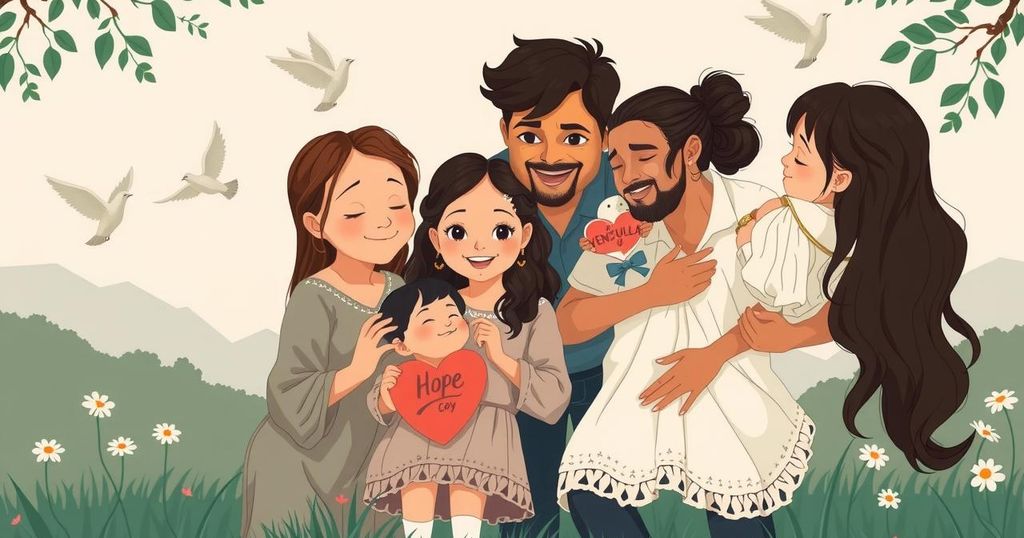Family of Deported Venezuelan Asserts Innocence Amid Government Claims

The García family defends Francisco García Casique, unjustly labeled a criminal by the Trump administration. Francisco’s deportation to El Salvador’s notorious prison has highlighted a pattern of wrongful deportations of innocent Venezuelans. Advocates for immigration reform demand justice and due process, emphasizing the need for humane treatment of vulnerable populations.
The family of Francisco Javier García Casique, a 24-year-old Venezuelan, strongly defends his innocence following Donald Trump’s administration’s derogatory remarks regarding deported migrants. The administration labeled these individuals as “heinous monsters” and terrorists, a perspective rejected by Francisco’s family, who assert he was only a hairdresser. His brother, Sebastián, emphasized, “He has never been in prison, he is innocent, and he has always supported us with his work as a barber.”
Recently, the García family had anticipated Francisco’s return to Venezuela after his deportation from a U.S. facility, but their hopes ended tragically when President Nayib Bukele of El Salvador released a video showcasing deported Venezuelans being escorted into a prison notorious for housing violent criminals. Sebastián’s shock was evident when he recognized Francisco among the mangled detainees, leading him to express the pain of finding his innocent brother in such a dire situation.
Immigration lawyer Lindsay Toczylowski expressed horror upon witnessing the spectacle of detainees being dehumanized in the viral clips. “It really is such an escalation … and to see it paraded and celebrated by the White House and by Bukele was just an absolutely shocking escalation of human rights abuses against migrants,” she said. The plight of Francisco is part of a broader pattern involving Venezuelans deported despite a lack of criminal records, raising concerns among human rights advocates.
Concerningly, over 260 Venezuelans were deported under wartime powers invoked by President Trump, with many families reporting similar experiences of unjust deportations. For instance, Mercedes Yamarte, another mother whose son was similarly deported commented on her son’s character, stating, “a good, hardworking boy” who has not committed any crimes. This sentiment echoed throughout social media, showcasing the innocuous lives of many deported individuals whose tattoos have been misinterpreted.
García’s journey from Venezuela to the U.S. has showcased his aspirations for a better life, documented vividly through social media, which has recently turned into a desperate appeal for justice. His brother Sebastián recounted their family’s dream of a better life that has come crashing down, culminating in Francisco’s unexpected imprisonment.
Advocates for immigration reform, including Adam Isacson from the Washington Office on Latin America, spoke against the recent deportation tactics, highlighting the unjust treatment of individuals like Francisco who are wrongly accused of wrongdoing. The narrative increasingly calls for a reassessment of the cases of innocent deportees who have been transpired into lives of anguish due to the abuses inflicted by both U.S. and foreign authorities.
Sebastián appealed directly to President Trump to reconsider his brother’s situation, voicing the injustice of deporting innocents. His assertion that, “I believe this is an injustice,” underscores a plea for humane treatment. As the situation illuminates the precarious lives of many, the urgent need for reevaluation of policies affecting vulnerable populations remains clear.
Overall, the García family’s experience sheds light on the severe consequences of aggressive immigration tactics and highlights the vulnerability of innocent individuals caught in such operations, raising a collective outcry for justice and due process.
The plight of Francisco Javier García Casique and others like him highlights the consequences of harsh immigration policies, particularly the wrongful labeling of innocent individuals as criminals. The emotional testimony of family members underscores the need for compassion and reassessment in deportation cases. Calls for justice echo loudly, pointing to a failure in protecting the rights of vulnerable populations navigating perilous circumstances during their quest for a better life. The growing outcry against human rights abuses reinforces the importance of ensuring due process for all migrants.
Original Source: www.theguardian.com







